If you’re running digital marketing campaigns on Meta platforms, you’ve probably heard about Facebook Events Manager and the Facebook Pixel. But how do these tools work, and why are they essential for your advertising efforts? Understanding how to set up and use the Facebook Pixel through Events Manager is crucial for driving conversions, tracking user behavior, and optimizing your campaigns.
In this article, we’ll break down the role of Facebook Events Manager, explain how to connect it to Shopify, explore its most popular use cases, and show you how to set up and use the Meta Pixel effectively.
What is Facebook Events Manager
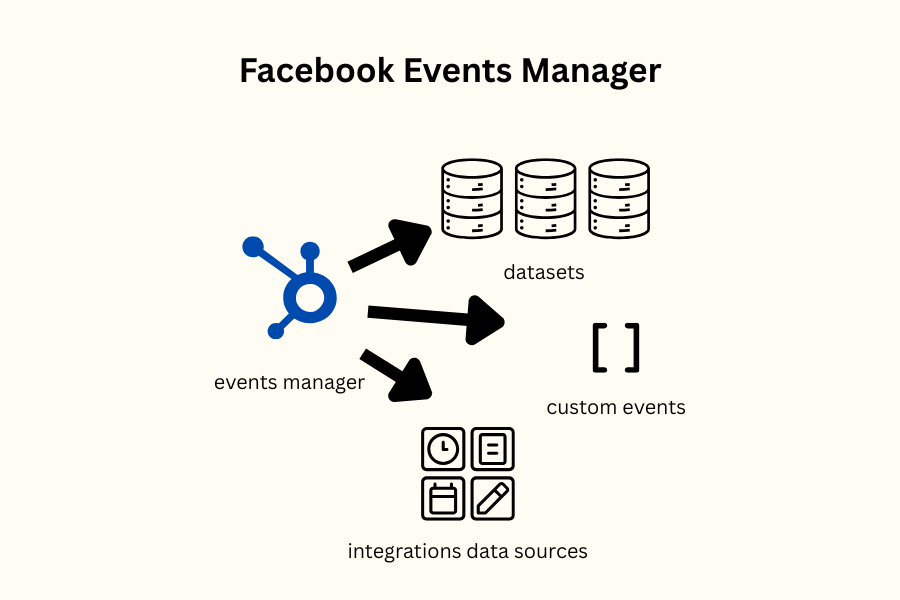
Facebook Events Manager is Meta’s centralized platform for tracking, managing, and analyzing events across your website, app, and offline channels. Think of it as the “control center” for your advertising data. Events Manager collects valuable information about how users interact with your brand, whether that’s browsing your site, making a purchase, or signing up for your newsletter.
At the core of Events Manager is the Meta Pixel, a small snippet of JavaScript code placed on your website. Once installed, it tracks a variety of user actions (called events), including:
- Page Views: When someone lands on your site or specific page
- Add-to-Cart Actions: When a user adds a product to their cart
- Purchases or Checkouts: When a user completes a transaction
- Lead Submissions: When someone fills out a contact form
This data is sent back to Meta, enabling you to understand customer behavior and make informed advertising decisions. Essentially, the Pixel allows you to see what happens after someone clicks your ad, helping you connect ad spend to actual business results.
Why Facebook Events Manager Matters for Your Campaign
Without Events Manager, you are flying blind. Even the most compelling ad creative won’t perform optimally without data to guide targeting and optimization. Here’s why Events Manager is essential:
- Accurate Conversion Tracking Events Manager helps you see which ads drive specific actions on your website. For example, if you’re running a campaign promoting a new product, you can track exactly how many people completed a purchase after clicking your ad. This eliminates guesswork and ensures you understand ROI.
- Custom Audience Creation With the data collected, you can build custom audiences based on user behavior. For example, you can retarget:
- Users who visited a product page but didn’t purchase
- Customers who purchased a specific product to promote complementary items
- People who added items to their cart but abandoned checkout
- Campaign Optimization Meta’s advertising algorithm can optimize ad delivery toward users most likely to take the action you care about. For example, if your goal is purchases, the algorithm will show your ads to users similar to those who have historically converted.
- Insights Across Multiple Channels Events Manager allows you to track activity not only on Facebook and Instagram but also across apps, offline sales, and e-commerce platforms like Shopify. This multi-channel visibility ensures you’re making data-driven decisions across your business.
Events Manager and Shopify Integration
For Shopify store owners, integrating Facebook Events Manager is a game-changer. Shopify has native integrations that make connecting the Meta Pixel straightforward and code-free. Here’s how it benefits your store:
- Automatic Event Tracking: Product views, add-to-cart events, checkout initiations, and purchases are tracked automatically.
- Facebook Custom Audiences: You can create custom audiences directly from your Shopify store data. For example:
- Users who added products to their cart but didn’t complete a purchaseCustomers who purchased a specific product or product categoryVisitors who spent a certain amount of time on your website but didn’t convert
- Advanced Optimization: With accurate data from Shopify, Meta’s algorithms can optimize ad delivery toward buyers, not just clicks.
- Simplified Compliance: Shopify’s integration helps with consent management, ensuring compliance with privacy regulations like GDPR and CCPA.
Setting this up is simple: connect your Shopify store to Meta via the “Sales Channels” tab, configure the Pixel, and select the events you want to track. Once activated, your campaigns will automatically benefit from accurate, real-time data and custom audience targeting, enabling smarter, more effective ad campaigns.
Most Popular Use Cases
Events Manager enables several high-impact marketing strategies. Here’s how businesses typically use it:
1. Conversion Tracking
Conversion tracking allows you to measure the exact ROI of your ad campaigns. For example, a Shopify store selling apparel can track which Facebook ad drove a completed purchase, the number of add-to-cart actions, and even the revenue generated per campaign.
2. Retargeting Website Visitors
Retargeting campaigns focus on users who have interacted with your site but didn’t convert. By using Events Manager data, you can create segmented audiences, such as:
- Users who viewed a specific product category
- Visitors who added items to their cart but didn’t complete checkout
- People who browsed multiple pages but never purchased
Retargeting warm audiences like this often results in higher ROI compared to targeting cold audiences.
3. Lookalike Audiences
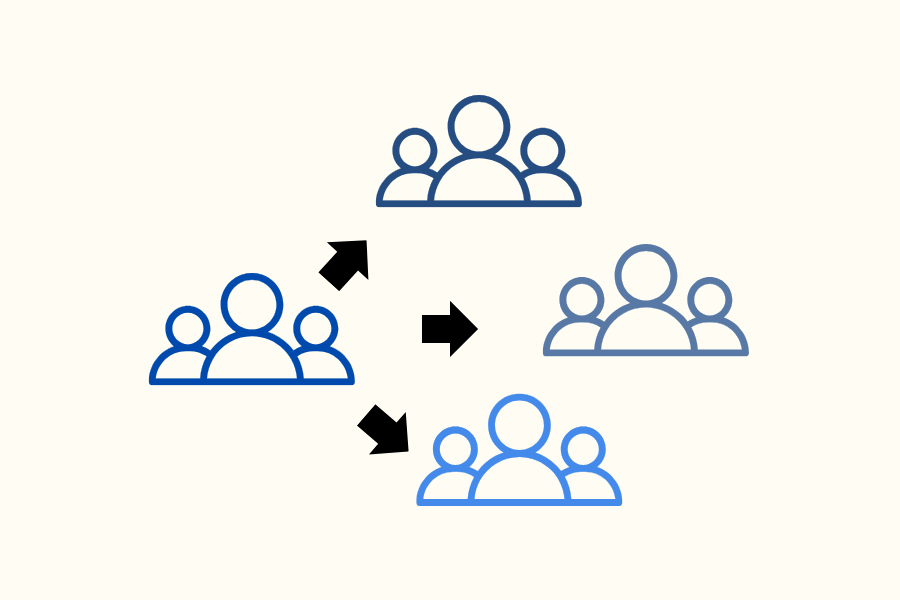
Using your best-performing custom audiences, you can create lookalike audiences—users similar to your existing customers. This strategy helps expand your reach efficiently, targeting high-quality prospects who are likely to convert.
4. Campaign Optimization
Events Manager feeds Meta’s ad delivery optimization. By tracking conversions, you allow Meta to optimize campaigns in real-time, automatically showing your ads to people most likely to take your desired action, whether it’s purchasing a product or signing up for a newsletter.
Setting Up the Meta Pixel
Installing and configuring the Meta Pixel may sound technical, but with Shopify and Events Manager, it’s simple. Follow these steps:
- Create a Pixel
- Go to Events Manager in Meta Business Suite
- Click Connect Data Sources → Web → Meta Pixel
- Add Pixel to Your Website
- For Shopify: Go to Sales Channels → Online Store → Preferences and paste the Pixel ID
- For other websites: Paste the Pixel code manually into your site’s header
- Define Standard and Custom Events
- Standard events: Purchase, AddToCart, Lead, PageView
- Custom events: Track any specific user behavior unique to your business
- Test Your Pixel
- Use Meta’s Pixel Helper Chrome extension to verify that events fire correctly
- Check Events Manager to see real-time activity and troubleshoot any issues
Once installed, your Pixel will automatically send real-time data to Events Manager, enabling smarter ad targeting, conversion tracking, and campaign optimization.
Data Sources and Integrations
Events Manager is versatile and can handle multiple types of data:
- Web & E-commerce Platforms: Shopify, WooCommerce, Magento
- Apps: Mobile SDK integration for iOS and Android apps
- Offline Events: Upload in-store transactions to connect offline activity to campaigns
- CRM & Marketing Platforms: Sync lead and customer data to optimize targeting
Combining multiple data sources gives you a complete view of your customer journey and allows for more accurate attribution. This data richness enables you to measure the true impact of your campaigns across channels and improve ROI.
Facebook Events Manager Tabs
Events Manager is more than just a place to set up the Meta Pixel. Its interface is divided into tabs that allow you to manage and analyze your events, data sources, and integrations. Understanding these tabs will help you navigate the platform efficiently and make the most of your marketing data.
Overview
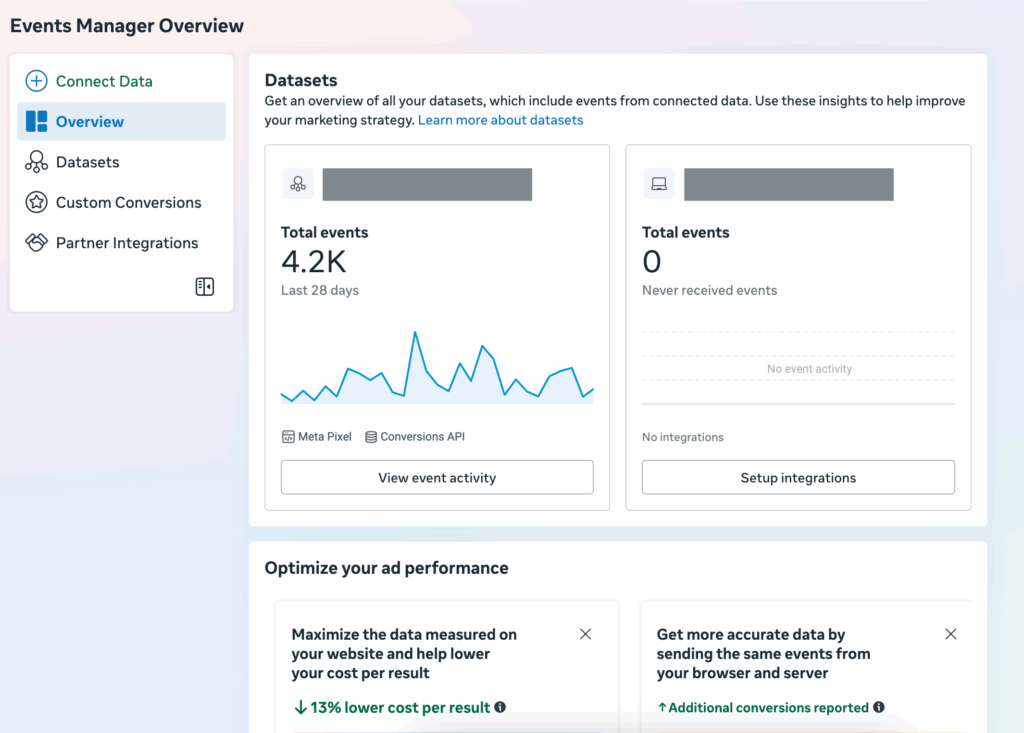
The Overview tab provides a high-level snapshot of your data sources and events. Think of it as your dashboard for tracking campaign performance and user interactions. Key features include:
- Event Activity Feed: Shows all tracked events in real time, such as purchases, leads, or page views.
- Performance Metrics: Metrics like total events, conversion rates, and attribution insights help you quickly gauge campaign success.
- Alerts and Issues: Highlights any tracking issues or discrepancies, such as missing Pixel data or inactive events.
The Overview tab is essential for daily monitoring and understanding whether your Pixel and events are firing correctly across your website or Shopify store.
Datasets
The Datasets tab allows you to manage all the raw data collected from your Meta Pixel, app SDKs, and offline sources. Datasets are the foundation of custom audiences and optimization strategies. Key aspects include:
- Data Source Management: See all Pixels, apps, offline event sets, and partner integrations in one place.
- Event Verification: Confirm that events are being collected properly and debug any errors.
- Server-Side Data: Datasets enable more accurate tracking beyond browser cookies, which is essential for bypassing restrictions like iOS 14+ and other privacy limitations.
By keeping your datasets organized, you ensure the quality and completeness of your marketing data, which directly affects audience targeting and ad optimization.
Custom Conversions
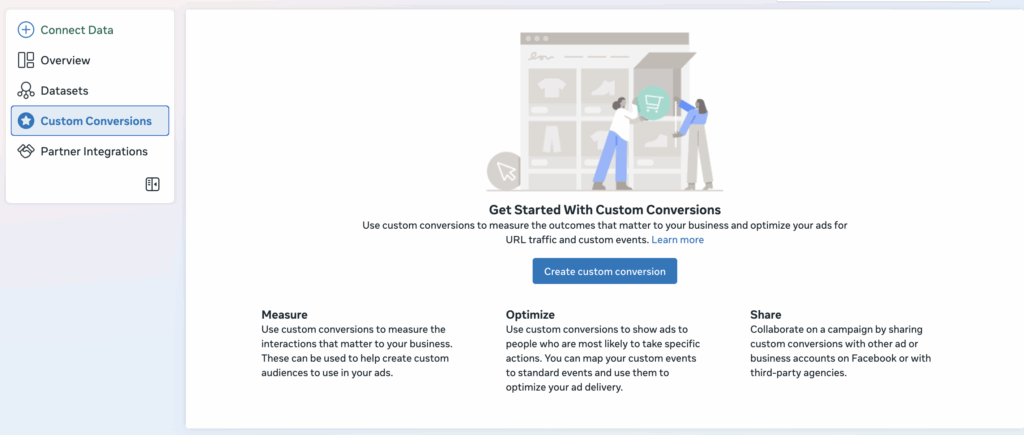
Custom Conversions allow you to define unique events based on specific URLs, parameters, or actions. This is particularly useful if you want to track actions beyond standard events like purchases or leads. For example:
- Track users who spend over $100 in a single transaction
- Track visitors who complete a multi-step sign-up form
- Monitor engagement with specific landing pages or product categories
Once defined, custom conversions can be used to:
- Optimize ad campaigns toward specific user actions
- Create highly targeted custom audiences
- Measure performance of specific funnels or campaigns
Custom conversions give you flexibility in tracking events unique to your business goals and allow Meta’s algorithm to optimize ad delivery for maximum impact.
Partner Integrations
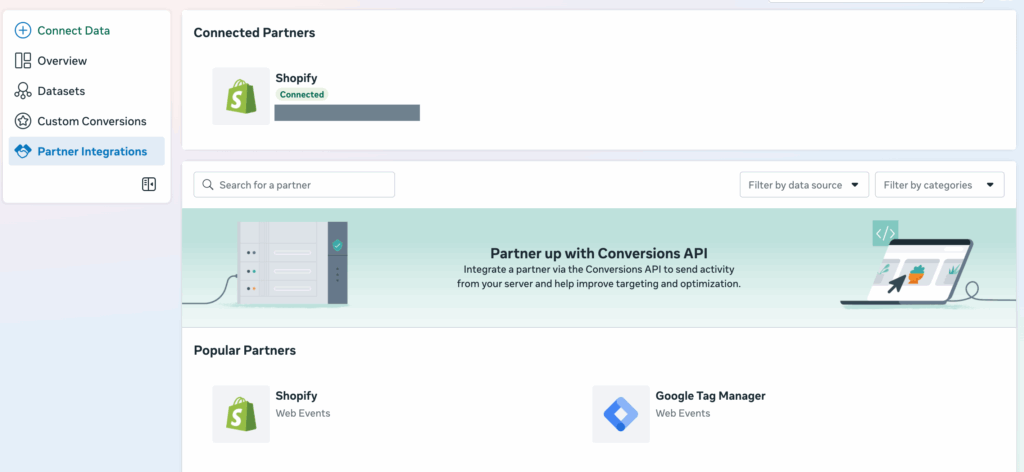
The Partner Integrations tab shows all third-party tools connected to your Events Manager account. These integrations help you unify data across platforms, including Shopify, WooCommerce, CRM systems, and marketing automation platforms. Benefits include:
- Seamless Setup: Connect your store or app without manually adding code
- Consistent Data Flow: Automatically track events like purchases, add-to-cart, or leads
- Enhanced Targeting: Use synced data to build custom audiences and retargeting campaigns
For Shopify merchants, this tab is crucial because it ensures your Meta Pixel is properly connected and your store data is accurately synced for campaign optimization.
Conclusion
Facebook Events Manager and the Meta Pixel are essential tools for advertisers looking to improve campaign performance, understand user behavior, and drive conversions. By integrating with platforms like Shopify, businesses of all sizes can access advanced targeting, conversion tracking, and data-driven insights without complex technical setups.
From building custom audiences and lookalikes to retargeting high-intent visitors and optimizing ad delivery, Events Manager allows you to leverage data to its full potential. If you’re serious about improving your Facebook ad performance and maximizing ROI, setting up the Meta Pixel through Events Manager should be a top priority.
With accurate tracking, comprehensive audience insights, and seamless Shopify integration, your marketing campaigns will not only be more efficient but also more effective in turning prospects into loyal customers.




